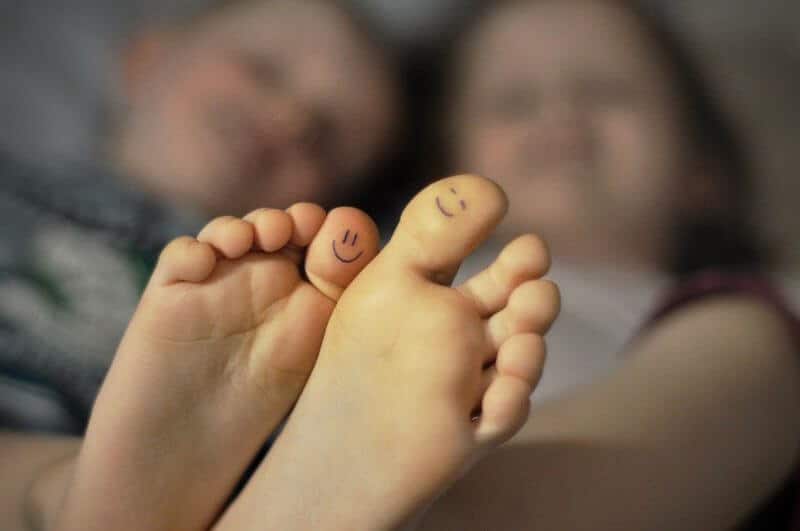With the autumn term well underway, most children and teenagers have returned to school after being educated at home for several months. Unfortunately, changing rooms, sports halls, swimming pools and other communal areas where pupils may walk barefoot can all too easily become breeding grounds for the troublesome foot condition known as verrucae. According to healthcare resource Patient.info, around a third of youngsters get at least one verruca.
Also called plantar warts, these frustrating growths appear on the soles of the feet and are caused by the Human Papillomavirus (HPV). Verrucae tend to be rough, fairly round and yellow or white with tiny black dots – which are actually blood vessels – in the centre. They spread easily; for example, if you and someone with a verruca walk across the same floor without socks and shoes on, you could well develop a verruca infection yourself. Having damp or damaged skin makes it easier for the verruca virus to invade your body.
Examining young children’s feet regularly for verrucae and encouraging older kids and teens to watch out for the issue is one way you can help to ensure your loved ones enjoy healthy back-to-school feet. Keep an eye on your own feet too: verruca infections are common, especially during term time, and parents can pick them up from their offspring. For instance, if your child develops one, your bathroom may well become a verruca hotspot.
Untreated Verruca Infections Can Linger for Years
While it’s true that some verruca infections clear up on their own, they can linger for years if left untreated. Healthcare provider Bupa estimates that children may need to wait up to two years for an untreated verruca to disappear, while adults may be faced with anything up to a ten-year wait. That’s far from ideal, especially as verrucae can make you feel embarrassed, cause pain when you walk, grow quickly and multiply to form clusters called mosaic warts.
There are steps you can take to reduce the risk of catching and spreading verrucae. They include wearing shower shoes in the bathroom, not sharing towels, protecting cuts and scrapes with plasters, and changing socks and tights on a daily basis. However, there’s no denying that verrucae are highly contagious, so it’s a good idea to familiarise yourself with verruca treatment options now in case you and/or a family member develop the problem.
Over-the-counter verruca remedies may be adequate if you’re dealing with a mild infection, but aren’t always successful. Bear in mind that you have to apply them yourself, which you may find difficult or unpleasant. Thankfully, expert help to tackle verrucae is available from our London podiatry team. We can formally diagnose the issue, help you to choose the right professional treatment for your and your family’s needs, and perform that treatment in a modern, ultra-hygienic environment.
It’s particularly important to see a podiatrist if verrucae grow rapidly, make physical activities challenging, have started to look different to normal, or are forming clusters.
Effective Ways to Get Rid of Verrucae
- Acid-based treatments – it’s important to note that the ones used by podiatrists are a great deal stronger than over-the-counter equivalents, so they tend to be a better choice for stubborn verruca infections. They need to be applied by a foot specialist over the course of several sessions. The acid destroys the infected skin cells, which can then be removed.
- Cryotherapy – this treatment involves freezing the affected skin cells in order to rupture them and force the verruca virus to enter the bloodstream, where it’s dealt with by your immune system. Several sessions are usually required.
- Verruca needling – your podiatrist will puncture the verruca a number of times with a fine, sterile needle. That brings the virus into contact with your foot’s fatty tissue, which is rich in infection-combatting immune regulators. One session is usually enough, so this option is popular with busy patients.
- Swift microwave treatment – this is a cutting-edge addition to the anti-verruca armoury. A probe emits microwave energy in order to heat up the infected tissue, destroying it quickly and precisely, even if your verruca reaches relatively deep into your foot. You may need several sessions or a single session may be sufficient.
London Verruca Treatment from Experienced Podiatrists
Our podiatrists have the qualifications and expertise required to provide effective London verruca treatment. We help patients of all ages, including young children, to overcome verrucae at our London Bridge podiatry clinic and four other convenient London foot clinics.
Take the first step towards saying goodbye to verrucae – contact Feet By Pody today.

